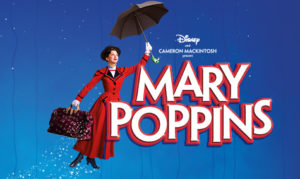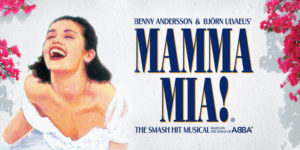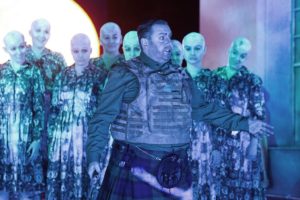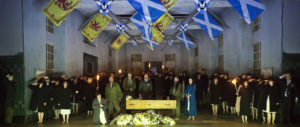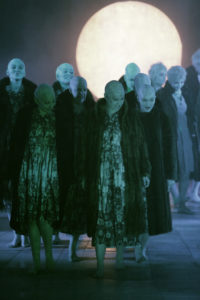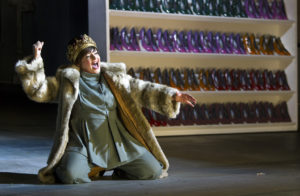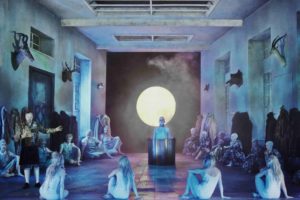
 (5 / 5)
(5 / 5)
The smash hit musical production returned to the Centre with director and choreograph Craig Revel Horwood from Strictly Come Dancing at the helm. Who gave this tried and tested production that has gone through various permutations since the 1992 Whoopi Goldberg film a real musical heart.
Sister Act tells the hilarious story of Deloris Van Cartier, a sassy nightclub singer in 1977/78 in need of witness protection after witnessing a murder. Deloris is hidden in the one place she won’t be found – a convent! Forced to wear a habit, and eat nothing but mutton, Deloris clashes with Mother Superior and begins to lead her fellow sisters astray, until she finds her calling in teaching them to sing.
Alexandra Burke really shines in the lead role of Deloris Van Cartier, each witty line or facial expression is delivered to perfection. However, it is when she opens her mouth to sing, we’re reminded of why audiences voted for her in there millions during 2008 X Factor. Burke’s voice never falters; her dancing is wonderfully expressive and comedic, it is her ability to make her audience laugh while ensuring their feet never stop tapping, makes her truly sensational as Deloris.
This show contains a fabulous group of musicians, who, instead of playing in the orchestra pit, take the role of various characters such as the trumpet playing Mother Superior played by Karen Mann. Who along with Burke are truly at the heart of this warm, funny and entertaining production but they are by no means the only ones. The whole cast displays a great deal of energy and enthusiasm and present as though they are loving life when signing Alan Menken original musical numbers including ‘Raise Your Voice,’ ‘Take Me to Heaven,’ and the show-stopping finale ‘Spread the Love Around.’
From the first moment to the big finale, the show is wonderful. A perfect lead in Burke, a great cast as well as a superb script and songs have been combined perfectly by the director into perhaps the best show to grace the stage of the Centre in a long time.
https://www.wmc.org.uk/Productions/2017-2018/DonaldGordonTheatre/SisterAct/
Tag Archives: Wales Millennium Centre
Review: Rent by Gemma Treharne-Foose
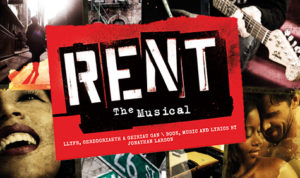
First things first, let’s get one thing clear – I am a steadfast ‘Rent Head’ and after this show – will remain so probably for the rest of my life and I make no apologies for this.
That being said, it’s been a whole 19 years since I was wowed (age 17 – yikes) by Jonathan Larson’s rock opera for a modern age. I wasn’t sure if the years had been kind to this production – would I even like it anymore? The show’s UK tour marks the 20th anniversary of the show.
Rent may have been billed as a parable of the modern age (inspired by Puccini’s opera La bohème), but it was also a snapshot of the 90s era, too: the cusp of the digital revolution, the internet age, the crude expansion of gentrification or ‘hipsterfication’ of previously bohemian neighbourhoods, the effects of AIDS on young communities following the 80s epidemic and scare stories. Maybe it would have lost some of it’s relevance? I had my reservations.
Back in 1998 at Shaftesbury Theatre in London, Rent was still very much in it’s infancy and was at the peak of it’s popularity, having won a shower of critical acclaim stateside (Pulitzer drama prize,four Tony awards, six Drama desk Awards, ‘Best Musical’ Awards and an Obie Award).

In ‘98, this was a show unlike anything else I had seen before. When I last saw it. I was an idiot teenager with a questionable taste in ridiculous infantile men. By the time I emerged from that theatre though, it shifted my view of the world.
But suddenly, my childish attempts to write poetry suddenly had context and purpose. I too wanted to dance on the table wearing spandex and hang from poles singing at the top of my voice like Mimi Marquez, go on protests like Maureen and befriend drag queens just like Angel Schunard.
In fact I did all of things…even though I couldn’t legitimately call myself a bohemian due to my love for global coffee chains. But even so – it didn’t even matter that my poetry was shit! I loved the way Jonathan Larson had pushed boundaries in the theatre world. I even went on to study Theatre and Media Drama and found my own little theatre circle…and my battered Rent CD (original Broadway cast recording) has accompanied me on all my journeys around the world since my 17th birthday.
So how to go about fairly reviewing a show that I have such a strong personal attachment to?
It may have been 19 years since I last saw Rent, but I can certainly see the differences (and improvements).
Lee Proud’s choreography was electric (fans of La Vie Boheme will love the table and chair dance), Angel’s acrobatic dance routine and of course the memorable ‘Tango Maureen’ – better and edgier than I remember at the Shaftesbury Theatre. Anna Fleischle’s set design includes multiple scaffolding layers on all sides and there nice touches – projecting Mark’s film on an old sheet, a trapeze, a pole, moving structures as vehicles for the characters, cages during the song ‘Contact’ – Maureen’s hilarious costume surprise during her protest song.
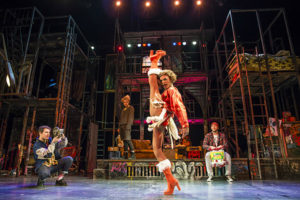
Rent is centred around a group of young struggling artists in New York’s East Village – they are fighting the property expansion and development which threatens to take over their performance space and remain true to their artforms and to themselves. I know how this sounds! And yes – over the years Rent’s edgy style (and way of incorporating social commentary into a musical) has been mercilessly parodied and skewered by the likes of Team America.
And yet! There are so many layers to unwrap and musical styles to bask in throughout this show…and try as I might even all these years later after seeing the first show in 1998, I couldn’t get through the first three songs without ruining my mascara and blubbing (I also snorted out loud…in front of some minor Welsh celebs in the audience. Oh well!)
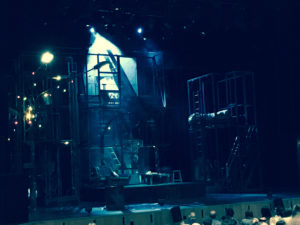
It’s sometimes a mistake to get so accustomed to an original cast recording that you can’t imagine anyone else singing those parts. All these years, I had no idea I was loving the voice of someone who would later become the voice of a Disney character (Idina Menzel, the original cast member for ‘Maureen’ went on to become the voice of Elsa, much to the annoyance of parents worldwide who had to listen to ‘Let it go’ 1,000 times a day).
I wasn’t sure how Lucie Jones (an X-Factor contestant – pah!) would handle the role of Maureen. And I was entirely wrong to pre-judge her due to my dislike of the X-Factor because not only did Lucie Jones absolutely SLAY the role of Maureen, she brought out even more of a kooky side to her (and single-handedly inspired me to lose three stone so I can look as amazing as she did in that body stocking! Wow).
Ryan O’Gorman’s sweet portrayal of Collins was beautiful – and his silky baritone vocals not only matched the calibre of the broadway version of Rent but perhaps even went one step beyond it.
The interaction between Leyton Williams (who previously had the title role of London’s Billy Elliot) as the lovely Angel and Collins was a joy to witness – and Layton brought a whole new talent to Angel’s ‘Today for you, tomorrow for me’ routine with astonishing leaps, spins and flips….and all in outrageous heels and a cloak coat.
You might think Jonathan Larson’s energy and optimism in the music and lyrics may come across as syrupy and hammy….but lord knows we need this more in 2017 than we did in 1996 when Rent opened.
For me Rent’s underlying sadness is that for all it’s popularity and influence, writer/composer Jonathan Larson’s early death (age 35) meant that he never got to see any of the success and joy that this musical has brought to people over the last 20 years.
Even all these years later, Larson ‘s story remains relevant and engaging for modern audiences. We are what we own. We’re knee-deep in a culture of mindless McJobs and as Mark and Roger sing: ‘We’re living in America…leave your conscience at the tone’. In the age of deportations and walls and blind gun laws (let along the way the tide is turning against LGBTQ communities), I really do question humanity sometimes.
I don’t know how many terms Donald Trump has or how many years of damage our current generation has ahead of them, but though it all I’ll still listen that old Rent CD of mine and remind myself that ‘We’re Okay’.
Bruce Guthrie’s production and Cardiff’s warm and inviting reception to Rent’s songs show me that there are still good people in the world. And I know this because all of them were mooing, crying, laughing and on their feet by my side at the end.
I’m definitely not leaving it another 19 years before I see this show again!
https://www.wmc.org.uk/Productions/2017-2018/DonaldGordonTheatre/Rent/?view=Standard
Type of show: Theatre
Title: Rent
Venue: Wales Millennium Centre (Cardiff)
Dates: 3-8 April
Book, Music and Lyrics: Jonathan Larson
Directed by: Bruce Guthtie
Director/choreographer: Chantelle Carey
Billy Cullum (Mark Cohen)
Ross Hunter (Roger Davis)
Ryan O’Gorman (Collins)
Layton Williams (Angel Schunard)
Phillippa Stefani (Mimi Marquez)
Lucie Jones (Maureen Johnson)
Shanay Holmes (Joanne Jefferson)
Running time: 2.5hrs (approx)
Produced by: Idili Theatricals Ltd / Theatr Clwyd
Review The Far Side of the Moon, ExMachina, WMC 24th-25th March 2017 by Emily Garside
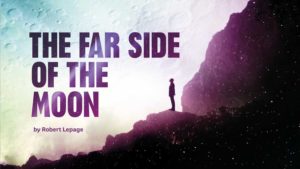
It is a rare opportunity to see Ex Machina, company of renowned theatre maker Robert LePage, perform outside of London in the UK, and the opportunity to see such a trailblazer of theatre practice first hand. The Far Side of the Moon, originally conceived and performed by LePage himself, now in the more than capable hands of Yve Jacques.
LePage, founded Ex Machina in 1994 and quickly gained attention with their early works notably The Seven Streams of the River Ota (1994) and Elsinore (1995). LePage’s work fuses styles and disciplines, he does not characterise Ex Machina as a theatre company, and nor does his work, either in performance or in film does not slot easily into traditional descriptions. LePage has become known for his fusing of film and performance, of multimedia across his work- video projections, soundscapes and projected dialogue sit alongside puppetry and performance and choreography. Meanwhile his interests as an artist similarly span multifaceted and multimedia approaches incorporating science alongside philosophy and art. It is fitting then, in 1999 when beginning work on The Far Side of the Moon, it was the question of science alongside art that is a catalyst to the narrative.
In parallel narratives- one public, the story of the space race, one private, the story of two brothers, LePage explores the nature of humanity, and the direction of life. The story unfolds of two brothers, one gay one straight, one confident, one shy, the younger seemingly successful, the younger still struggling. Their domestic narrative is played out against the backdrop of the Space Race and younger brother Phillipe’s endless fascination with the cosmonauts, pitted against their ever more glamorous American counterparts the American Astronauts. The parallels between the struggling student and his glamorous and famous weather presenter brother are clear.
The storytelling is tightly woven, and complex, veering across Phillipe and Andre’s lives, touching on their childhood and adolescence, through their current situations and frustrations. It is a highly domestic, family oriented tale at its heart with everything circling back to the death of their Mother, and the realisation of what life is like without any parents.
The technical elements of the show are, as expected, astounding. In the hands of a lesser company the might come off as gimmicky, but here the fusion of projections alongside The performance is truly theatrical in its reliance on Jacques performance to encapsulate both brothers and a variety of peripheral characters, but also in the use of stage and props in a very traditional way. Although LePage is perhaps best known for his fusing of film and theatre, here although the film and multimedia elements are moments of brilliance, it is moments of simple theatricality that highlight the skill and attention to detail in the performance. When an ironing board becomes a bike, for example, and later a bed, or when through subtle costume change and mannerism Jacques becomes another character. The brilliance of LePage’s work is the fusion of these elements, and despite being a work of technical precision, it also has a very instinctual, organic feel that comes back to the engaging storytelling at its heart.
As LePage’s creation is always about fusion of elements, the bringing together of The Far Side of the Moon rests on the performance of Jacques. An intimidating ask to take on the very personal story that LePage wrote- he draws on his own Mother’s death, as well as hinting at his personal struggles with depression and coming to terms with his sexuality- as well as taking on the piece that LePage performed himself. However, Jacques having toured this piece for several years, has an easy stage presence which makes the precision performance of both hitting technical markers to allow projection, puppeteer or set to take over the storytelling, while also delivering two hours of single-handed narration while embodying Andre and Phillipe’s characters. Jacques does it with an engaging personable warmth that also brings the audience into what for those uninitiated might see as the daunting prospect of LePage’s theatrical world.
Robert LePage sets out to create fusion in his work- fusion in performance through multimedia, traditional and innovation, and through thematically, addressing issues side by side that might not traditionally be addressed. These elements alone could be a cold exercise in performance for performance sake, experimentation for experimentation’s sake which could leave the average audience alienated. It is the credit of LePage and the company that his work does not do this, while The Far Side of the Moon is a great introduction to the theatrical style Le Page is known for, while it is a challenging fascinating study of performance methods, it also keeps at it’s heart the element of storytelling. So while audiences may be intrigued, puzzled and hopefully challenged by seeing what may be a new approach to theatre for them as this work tours the UK and the world, they will also be invited in, and moved by, the story that facilitates the performance.
http://lacaserne.net/index2.php/theatre/the_far_side_of_the_moon/
Review: Youth Dance Night at NDCWales by Helen Joy
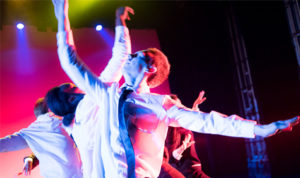
NDCW Youth
Right, this is a hard one; I have thought long and hard about this review.
My conclusion is this: I am not here to comment on any of the pieces critically, I am here to congratulate and celebrate everyone involved in creating beautiful dance through giving all these extraordinary young people the chance to dance.
Every dance has a message for us and in essence I think it is this:
“Listen to us, we may be young and we may seem to have so little experience next to you, the big grown-up, but we have a voice and we feel and we want you to hear us and respond. Our need to express ourselves and to be understood is as great as yours and we will be heard, we will use clothes and colour and tears and anger; we will use movement and action; we will use dance.”
Each piece is so different, working so carefully with the ages of the dancers, their abilities and their stories. Some dancers have that special something – you can already see it, something in the way they look straight at you, something in the way they love the connection between their bodies and their minds, something just special. Every dancer in front of us performs as a professional – confident, charming, athletic and poised. Confident enough to use humour and we in the audience are impressed and laugh with them.
They dance of war and remembrance, of love and loss, of action and inaction, of communication and self.
I have no warm personal association with this – I was once in the wrong queue at junior school and accidentally arrived in the ballet class, surrounded by pink leotards and birds in cages. I was about 6. I can still feel the horror of it.
Yet, here I am wishing and wishing I had had the gumption these young people have and to have stayed in that class; wishing I had that gumption now too. What amazing young people they are, what remarkable people they will remain and in part because of this opportunity they have the gumption to take, to value and to work at – for none of this comes easy, I am sure.
I am sitting next to Luke, a dance teacher, and we discuss what makes the difference between the Associates’ piece and everyone else’s. There is something about the last piece which is more polished than the others, slicker somehow. Time is partly the answer – these dancers have been selected and given the time to train in a way the others do not have.
This suggests to me that it is time that we all must have to perfect what we do – all these young dancers deserve our support to give them the opportunities and the time they need to grow into the adults who will make our world more than just a little better.
To support ETC, Fantasy Feet, Rubicon and the NDCW, please see the links below.
Every young person should have the chance to dance, please help them to get that chance.
Helen Joy for Get the Chance, 3rd Act Critics.
Curator: Caroline Finn, NDCW Artistic Director
Showcasing:
ETC Youth Dance
Fantasy Feet (2 x pieces within their 12 minute slot)
Rubicon (Urban Flagship Group)
Joon Youth Dance Company
National Dance Company Wales Associates
Seen: 26 February, 2017
Where: Dance House, WMC, Cardiff
Tickets: £10 | Concessions £7
Find Youth Dance at:
Fantasy Feet, Merthyr Tydfil
http://www.fantasyfeetdance.co.uk/
Rubicon Dance, Adamsdown, Cardiff
http://www.rubicondance.co.uk/
Joon Dance, Solva, Pembrokeshire
https://www.facebook.com/JoonDance/
ETC Youth Dance
https://twitter.com/etcdance
NDCWales, Wales Millennium Centre, Cardiff
http://www.ndcwales.co.uk/en/get-involved/dance/associates-age-14-19/
To support National Dance Company Wales, please consider their new Lift Lifft scheme at http://www.ndcwales.co.uk/en/about/support-us/individual-giving/
Review: Love’s Poisoned Chalice season – Madam Butterfly & Le Vin Herbe
Madam Butterfly & Le Vin Herbe
Love’s Poisoned Chalice
Welsh National Opera at Wales Millenium Centre
Madam Butterfly 
Sweet little Butterfly is but 15. A child. A beautiful, lost child to us.
Pinkerton is to our eyes horribly unattractive, horrible in deed, fact and person. I don’t want him anywhere near her.
But, she is in love and he is in lust.
He is the archetypal American soldier – overpaid, oversexed and over here. He has the tacit and overt support of his colleagues. He blinds Butterfly’s friends and family with his pomp and wealth.
It is an arranged marriage. Butterfly enters into it with enthusiasm and a love for Pinkerton which is not reciprocated.
He, of course, leaves her. She brings up their child with the help of her servant, Suzuki, over the 3 years of his absence in hope and penury. Pinkerton returns with his American wife and they assume the boy as their own. Butterfly kills herself. She has loved too much.
Not a new story in any sense. It is utterly predictable and pitiful. And honest.
I have seen this production before but I have not heard or seen such an utterly perfect Butterfly before. She is a little light burning into the sepia staging. She sings with her soul on fire.
Le Vin Herbe 
The story of Tristan and Iseult the fair. Accidental lovers brought together by circumstance and potions. Their love is inconvenient and uncontrollable. Their exile and their isolation disrupted by a secret visit from the king, Iseult’s husband to be, who leaves his sword to show his lenience. The lovers overthink his intentions and return to their respective lives at court.
Tristan marries Iseult of the white hands who takes her revenge on his love for the ‘other woman’ when he is dying. Iseult returns to die over his dead body. The brambles entwine their bodies for eternity.
An outstanding production. Skeletal, dark, passionate, ironic. Show-stealing leads against an outstanding chorus. This is a well-known story well told and chest-beatingly hot.
A few thoughts:
Now, both of these operas are about love and life and fate and death. They both imply you can love too much. They both sing to us of the nasty twisty business of chance and tell us that passion will end badly. They both show us women who give up their hearts to their men, to their lords and masters.
Butterfly sees a way to a happy, comfortable, settled life with her soldier and gives up her faith, family and friends to do so. Iseult gives up a husband, crown, wealth and status to follow her knight into the woods to live in a poor shed full of flowers.
Pinkerton makes no sacrifices; he is not in love. Butterfly, Tristan and Iseult are all in thrall to love and make the ultimate sacrifice. Pinkerton is rewarded for his disinterest.
Messing with fate is clearly a bad idea but the music it invokes is not. These are two visually and vocally disparate operas with similar stories to tell. They are well chosen, well cast and masterly.
Madam Butterfly’s Un Bel Di Vedremo is Puccini at his best; Le Vin Herbe is opera at its best.
Event: Madam Butterfly, Puccini
Seen: Feb 10, 2017
Website: https://www.wno.org.uk/event/madam-butterfly-0
Running: Friday, February 10, 2017 – Saturday, April 29, 2017
Conductor Lawrence Foster (until 4 Mar). Andrew Greenwood (from 24 Mar)
Director Joachim Herz
Revival Director Sarah Crisp
Designer Reinhart Zimmermann
Costume Designer Eleonore Kleiber
Chorus Master Stephen Harris
Lieutenant Benjamin Franklin Pinkerton Jonathan Burton
Goro marriage broker Simon Crosby Buttle
Suzuki a servant Rebecca Afonwy-Jones
Sharpless the American consul David Kempster
Cio-Cio-San (Madam Butterfly) Karah Son
A Welsh National Opera production, sung in Italian
……………………..
Event: Le Vin Herbe, Frank Martin
Seen: Feb 17, 2017
Running: Thursday, February 16, 2017 – Tuesday, April 25, 2017
Conductor James Southall
Director Polly Graham
Designer April Dalton
Lighting Designer Tim Mitchell
Storytellers Full Company
Iseult’s mother Catherine Wyn-Rogers
Iseult the Fair Caitlin Hulcup
Brangien, companion Rosie Hay
Mark King of Cornwall Howard Kirk
Tristan his nephew Tom Randle
Duke Hoël a nobleman Stephen Wells
Kaherdin his son Gareth Dafydd Morris
Iseult of the White Hands Sian Meinir
Solo narrators Anitra Blaxhall, Rosie Hay, Sarah Pope, Joe Roche, Howard Kirk, Stephen Wells, Catherine Wyn-Rogers
A Welsh National Opera production, sung in English
Review Madam Butterfly, WNO, WMC by Barbara Michaels
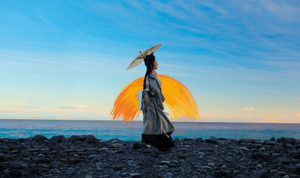
You can listen to Barbara reading her review at the Soundfile below just click on the link.
Madam Butterfly Wales Millennium Centre Cardiff
Music: Giacomo Puccini
Libretto: Guiseppe Giacosa and Luigi Illica
Director: Joachim Herz
Revival Director: Sarah Crisp
Reviewer: Barbara Michaels
 (4 / 5)
(4 / 5)
That most heartrending of operas, Puccini’s Madam Butterfly is staged by Welsh National Opera as the second in their Love’s Poisoned Chalice season. Following on after La Boheme, which opened the season, Butterfly is, like the former, one of the most popular operas and as a consequence – in these days of cuts to the arts funding – one of those most often performed.
Once again, it is a case of reach for the tissues as the story of the Japanese fifteen-year-old geisha, Cio-Cio San, who gives her heart to, and marries, a bounder of an American naval lieutenant, one Benjamin Franklin Pinkerton who doesn’t take the marriage seriously, unfolds towards its tragic end. In restaging this opera which they first performed back in 1978, WNO have wisely adhered to the original format directed by Joachim Herz and first performed at La Scala Milan in 1904.
Sepia toned sets emphasise that this is old Japan – and the gulf between the two worlds and their values runs as an undercurrent throughout, at times becoming more prominent. The political undertones are emphasised throughout the libretto, epitomised by recurrent musical themes in the orchestration, as well, as in the repeated playing of the Star Spangled Banner.
This time round WNO has honed and polished their performance of the poignant story set to Puccini’s wonderful score to a state of near-perfection. This is due in no small part to Karah Son’s portrayal of the central role of Butterfly. Not only has the South Korean soprano a voice of the utmost clarity, with a seemingly effortless ability to soar to the high notes which the role demands, but Son excels both in Act I, as the innocent young girl who believes in true love everlasting (only to be thoroughly deceived and let down by that cad and absolute bounder Pinkerton) and in Act II, where she achieves the difficult shift to the more mature Butterfly, bringing depth to the tragic denouement This requires not only a change in characterisation but in style of singing, and this Son does, notably so in the beautiful aria One fine day..
In the role of the bad guy (and what a cad Pinkerton is to abandon his young wife so callously) Jonathan Burton’s tenor is pleasing, particularly in his duets with Son. His portrayal of the callous and worldly Pinkerton contrasts well with the naivety of the young Japanese girl who has never been further than Nagasaki, but Burton does at times lack facial expression. One could perhaps argue that this is intentional on the part of the director in that Pinkerton is a reflection of the attitudes that existed during that era. Nevertheless I would have liked a tad more expressiveness from Burton, as this can at times make him appear a tad wooden in the role.
Welsh baritone David Kempster brings gravitas to the role of the Consul who does his best to avert the tragedy, while as the bowler-hatted marriage broker Goro, Simon Crosby Buttle skips around the stage in great form. As ever, the WNO chorus is an added bonus, particularly so as the posse of Butterfly’s geisha friends in Act I, and the rendering with the orchestra, under conductor Lawrence Foster, of the humming chorus in Act II.
A production honed to near perfection which should not be missed. Catch it if you can.
Runs at the Wales Millennium Centre 17, 18 February, then touring,
Review: Sunny Afternoon by Corrine Cox
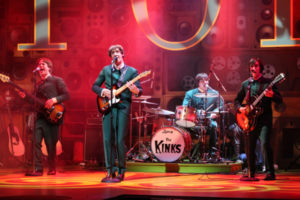
With speckled references to the hits throughout the storytelling, this clever writing creates an enjoyably impatient anticipation for the big numbers but also the impression that we are watching the creative genius unfold.
 (5 / 5)
(5 / 5)
As we’re teased with references to the iconic You Really Got Me in the opening sequence there’s already a palpable sense of anticipation pulsing around the auditorium of the Wales Millennium Centre as the cast of Sunny Afternoon prepare to take us on a 2½ hour musical journey through The Kinks rise to stardom. From the early days in North London; their debut on Top of the Pops; the infamous American tour; through to their triumphant comeback, Joe Penhall ingeniously weaves the hit songs from the 60s into the storytelling of one of the most influential bands of the era.
Our story begins in Muswell Hill, with performances by Ryan O’Donnell & Mark Newnham perfect characterisations of the often tense professional relationship between the rebellious Davies brothers, as they navigate the initial tensions to discovering the bands distinctive sound, the start of a journey which would shape a unique musical identity that would inspire generations. Throughout the evening O’Donnell, Newnham (a highlight performance), Gallo, Rhys and the supporting ensemble, blend effortlessly to recreate the iconic sound of the band, in what is a moving portrayal of both the professional and the personal lives of the band and their adjustment to the pressures of stardom. With references to the hits speckled throughout the storytelling, this clever writing creates an enjoyably impatient anticipation for the big numbers but also the impression that we are watching the creative genius unfold.
Throughout the exploration of the soaring highs and the frustrating lows the band encounter, we join the cast in a celebration of how four working class musicians from North London changed the music scene for generations to come. Dead end street, weaved masterfully into Penhall’s narrative, particularly highlighting how the bands upbringing proved an ongoing source of inspiration for Ray’s writing with the majority of the works involving similar elements of social commentary, which inevitably played a large part in their then and ongoing appeal.
The staging enables the cast to create a certain intimacy during acoustic interludes including This Time Tomorrow and Thank you for the Days, contrasted with the gig feel of the iconic All Day and All of the Night & roof raising end sequence, and quirks of the choreography and use of props lend themselves especially well to the playfulness of numbers such as Dedicated Follower of Fashion.
The universal appeal of Sunny Afternoon makes it a must-see irrespective of whether you know the band or the songs. If you know The Kinks you’ll love it, if you don’t know the Kinks you’ll love it. A feel good musical and a moving portrayal to one of the defining bands of the 60s who will continue to inspire generations to come.
Ray Davies – Ryan O’Donnell
Dave Davies – Mark Newnham
Mick Avory – Andrew Gallo
Pete Quaife – Garmon Rhys
Music & Lyrics – Ray Davies
Book – Joe Penhall
Original Story – Ray Davies
Director – Edward Hall
Designer – Miriam Buether
Choreographer – Adam Cooper
Lighting – Rick Fisher
Sound – Matt Mckenzie
Musical Supervisor – Elliot Ware
Review ‘Mary Poppins’, WMC by Kate Richards
Sitting in the Wales Millennium Centre awaiting ‘curtain-up’ at Mary Poppins, I felt slightly sorry for the cast and production crew, at the huge task they faced in trying to impress the likes of me. Not a huge fan of musical theatre at the best of times, somewhat taken aback at the eye-watering cost of taking a family of four to the theatre at Christmas, and yet at the same time harbouring high expectations of being transported to a bright, magical world far away from Brexit, the state of the NHS and all the other gloomy headlines…..I was not disappointed.
As the curtain rose I felt my hackles rise slightly as the hubbub of the audience took too long to die down, but thankfully the volume and energy of the production soon drowned-out the residual noise and fidgeting of the younger audience.
What followed was a fast-paced, re-invention of the story that we know and love, interspersed with just the right mix of slick ‘magic tricks’ (pulling the hat stand out of the carpet bag, sliding up the banisters and making pictures come to life) and all the big songs you’d expect from this production. I was surprised at how different the story and structure was from the original film version, but this did not diminish the production at all – in fact it made it easier to watch for those of us that are very familiar with the dialogue of the iconic film.
The children, though ‘ringleted’ and clad in sailor dress and tank-top respectively, had a bit more attitude than I remember from the film, but I have no doubt this helped to make them more relatable to a modern audience, and helped make the whole thing a little less saccharine than I was expecting. The same could be said for Mary herself – though Zizi Strallen was every inch Mary Poppins from her clipped, received pronunciation to her turned-out toes.
I’m still not sure how Mary actually appeared on the stage, since we were distracted (not for the last time) by the creative use of lighting above the audience, so when our eyes returned to the stage – there she stood, perfectly poised.
The set was totally in-keeping with expectations of the house in Cherry Tree Lane (like the doll’s house you dreamed of as a girl but only collectors actually own), the colourful park and contrasting austere, greyness of the bank, and scene changes were slicker than other big budget productions I’ve seen in the West End. The pace and juxtaposition of the monochromatic scenes in London and the bank versus the vibrant colour of the park and the house scenes worked well at holding the attention of even the youngest audience members, and kept-up the momentum of the story.
I was amused to note that the ‘pre-teen’ beside me, pointed out every wire on the kites, and each cable used by Mary and Bert for their gravity-defying moves to her mother, but considering the challenges of staging this musical, it was actually gratifying that these were the only little bits of ‘reality’ she appeared to spot through-out the evening.
All-in-all it was the visual feast that I’d hoped for and it seems that the big budget really does buy you quality in everything from talent to sound, and costume to lighting. It is hard to pick out individual performances or highlights because the whole production worked seamlessly to create a theatre-going ‘experience’, where all the cogs meshed perfectly in a well-oiled machine. I went to see the production with my ‘Mum hat’ on wondering what my 6 and 10 year old nephews (and eventually my own child when he’s old enough) would make of it – would it be too ‘girly’ and surely there would be a very narrow window of opportunity when a child was old enough to sit through it, but not too old to dismiss it as ‘babyish’ or ‘uncool’? As I reflect on my experience, I know that my nephews would have been transfixed, and I would be so bold as to suggest that my husband would have enjoyed it too; the polished performance absolutely transported me to another world for a couple of hours so I concluded that it would be worth saving up for this as a special family treat at Christmas, and I might even give a few more popular musicals a try.
Review ‘Mamma Mia The Musical’ Wales Millennium Centre by Sarah Debnam
Mamma Mia the musical opened at the Wales Millennium Centre in Cardiff this week and the buzz and excitement surrounding it meant that expectations were high.
Let’s start by saying the show began as expected, with Sophie posting the invites for her wedding to her three potential fathers, showing determination and emotion as she did so, a perfect opening scene and introduction to one of the main characters. We were also introduced to Lucy May Barker’s singing voice and what a voice! Brilliant!
We then meet Sophie’s friends, Donna and her friends and the other main characters, including Sophie’s Fathers. All of whom I think we’re perfectly fitting for their roles. Especially Donna. Sara Poyzer that plays Donna, had a hint of Meryl Streep in her energy, however a phenomenal voice to carry those fantastic ABBA songs to every corner of the room, and have every person there enthralled.
As the story moves on we were treated to classics such as ‘Money, Money, Money’, ‘Lay All Your Love On Me’, ‘Our Last Summer’ and of course the entertaining ‘Does your Mother Know?’ Which happens to be one of my favourite parts in the film, and Emma Clifford that plays Tanya did it justice. Also the men showing off their dancing skills and choreography was outstanding, especially Louis Stoical who plays Pepper with his jumps, energy and humour!
It’s worth noting the simple but very effective scenery and spectacular costume designs, as well as the incredible orchestra really bring the whole thing together.
Of course the show had to find its ending sadly and even though it’s hard to compare the stage show with the film, the wedding preparation and wedding certainly lived up to expectations, ‘Slipping Through my Fingers’ no doubt caused a few teary eyes and certainly felt like a special moment.
The party like atmosphere at the end had everyone up from their seats dancing and singing along to ‘Dancing Queen’, inhabitations lost and I’m sure everyone left that room feeling great!
The audience were clearly hooked from beginning to end, with oohs and ahhs and plenty of laughter, the cast did an absolutely amazing job of entertaining everyone last night, and even though the film was a hit, this show was funnier, livelier and had more energy. I can understand the buzz surrounding Mamma Mia now, and might even try to catch it again before it leaves Cardiff!
Review Macbeth WNO by Barbara Michaels
All photographic credits Patrick Redmond
 (4 / 5)
(4 / 5)
Reviled by many as one of Shakespeare’s more unpleasant plays, and referred to by thespians as ‘The Scottish Play’ because of its reputation for bringing bad luck to performances, Macbeth was described by Verdi himself as ‘One of mankind’s greatest creations.’ Oliver Mears’ gripping modern day production for Welsh National Opera, in conjunction with Northern Ireland Opera, holds its own, opening up a huge range of interpretations on account of its deep psychological reference.
For those unfamiliar with the play on which it is based, Macbeth is a soldier whose wife’s aspirations of greatness are his downfall, leading to his ultimate death. Returning with his friend Banquo after a successful battle, he meets a coven of witches who predict that he will become firstly Thane of Cawdor and then King of Scotland, but that it will be Banquo’s children that subsequently inherit. On arriving home, Macbeth tells his wife who informs him that Duncan, the present King of Scotland, will be visiting and staying the night. Duncan duly arrives and announces that he is bestowing on Macbeth the title of Thane of Scotland. Not content with that honour, Lady M. sees this as the perfect opportunity to kill him and thus make the second part of the witches’ prophecy come true. She easily persuades Macbeth to murder his monarch while he is asleep, but the killing doesn’t stop there.
A balletic opening with the witches grotesquely portrayed as shaven-headed mannequins, and grey-haired humpbacks gets the action started before Spanish baritone Luis Cansino appears in battledress as Macbeth. The appearance of Lady Macbeth in Scene 2 leads into the first murder, followed by the duet which Verdi himself described as being of major importance. The justly renowned chorus of the WNO are increased in number with extra singers in order to cope with different guises which include not only the witches’ coven, but ghostly apparitions, and others, including in the final act refugees from the havoc caused by Macbeth’s widespread killings of those he sees as threats to his rule.
Sung by American soprano Mary Elizabeth Williams, this Lady M is a ballsy, modern woman, sexy even at her desk and displaying her thighs with calculated intent. This is a power-crazy female who will stop at nothing to get what she wants. Williams has the demanding role to a T, fully in control from start to finish; not until the final act do we see the cracks in the surface which reveal the deep underlying psychological problems as lady Macbeth sleepwalks, rubbing her hands to rid them of the bloodstains no longer there and singing broken phrases opening up into great arches of song. Musically, Williams is superb, with a soaring soprano that takes the breath away, both in breath-taking solo arias and duets with Macbeth.
Set and costume designer Annemarie Woods has created a minimalist Scottish castle and a wood that moves, plus costumes with swinging kilts. There are, however, two provisos – Duncan’s costume of bright blue jacket, knee-length white socks topped off with a gilt crown is a tad pantomimic, while the dark kilts and gilets worn by the chorus in the final act are reminiscent of school uniform.
Runs: September 15, 17 and 24th; October 12th; November 2, 9 and 23rd.
Macbeth Welsh National Opera at Wales Millennium Centre
Opera in four Acts based on the play by William Shakespeare
Music: Guiseppe Verdi
Libretto: Francesco Maria Piave
Director: Oliver Mears
Reviewer: Barbara Michaels


